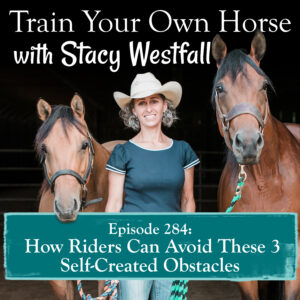Episode 284: How Riders Can Avoid These 3 Self-Created Obstacles

In this episode, Stacy shares three ways riders unintentionally complicate their journey, creating unnecessary hurdles in the process.
This includes a discussion on thoughts like, “I started too late, I didn’t have the opportunities, it wasn’t meant for me.”
The first way is by not exposing themselves to others who are actively engaging in the work, both showing real progress and being honest about the challenges. This step is crucial for maintaining perspective and finding inspiration.
The second way is by not distinguishing between the ‘hard’ of physical or mental effort and the ‘hard’ of suffering. This can lead to an unhealthy attitude toward the struggle, where the suffering seems insurmountable. Instead, riders should embrace the physical challenge while drawing boundaries on emotional suffering.
The third way is by expecting everything to be hard, leading to a ‘grit my teeth’ mindset. This can create a sense of emotional bracing, where riders prepare for difficulty at every turn, even when things could be easier. We encourage listeners to identify parts of their journey that could be physically challenging but not emotionally taxing, allowing for a more balanced approach to the ride.
2 Comments
Leave a Comment
SUBSCRIBE TO THE PODCAST HERE:





YOURS FREE
WHY IS MY HORSE...?


Hey Stacy…I needed to hear this. You know I would like to get into reining BUT…. really don’t know where to start. I would like to come to a CORA show and see what a green reiner looks like. That will be good for me to see and experience. Loved this podcast!!
Brilliant podcast – enlightening, practical and inspiring – awesome